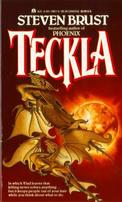
| Series: | Vlad Taltos #3 |
| Publisher: | Ace |
| Copyright: | January 1987 |
| ISBN: | 0-441-79977-9 |
| Format: | Mass market |
| Pages: | 214 |
This is the third book in the Vlad Taltos series, a chronological sequel to the first book (Jhereg). The series bounces around a lot and any of the books are readable independently, but Yendi is useful to introduce Cawti and there are references to events in Jhereg.
Teckla struck me as an interesting change of pace since Vlad's high-level contacts among the Dragaerans are mostly irrelevant to the story. Vlad has his territory and his organization (Yendi sets this up at some length) and this time that's not much in question. Instead, the plot revolves around Cawti and a political movement among the Easterners of the city and the Teckla, the Dragaerans of low social class who do most of the menial work. Cawti becomes very interested in this movement and associated with some of its leaders, whereas Vlad is cynical and faintly disgusted with the whole thing and cares only about keeping Cawti safe.
The story is a bit annoying in places because Vlad and Cawti are at loggerheads and not communicating. It's also not the same sort of twisty adventure as the previous two books. But I find the political conflict that Brust set up surprisingly tricky, and to have a disaffected cynic as the viewpoint character leads to approaching the conflict from less common angles. Usually, popular labor movements (essentially a revolutionary socialist movement in the context of the book) are shown as either great good or great evil; less often are they shown as nuanced and possibly futile idealism. The sort of conflict that Vlad and Cawti have here is very realistic and disturbingly relevant in a way that most fantasy politics isn't. I particularly liked how Vlad's opinions evolve over the course of the story, not in the simple and expected direction of being won over by Cawti and her friends.
Writing a political novel in a fantasy world is tricky, and doing so without clearly taking sides on the underlying political question is even harder. I think Brust pulls it off remarkably well while still maintaining much of the wise-cracking adventure style of the previous books. There are no great revelations about social structure here, and depending on one's political views the sides may or may not seem balanced, but the balance worked extremely well for me. Despite the normal inclination to agree with the viewpoint character, Teckla kept me alternating through much of the book between agreeing with Vlad and agreeing with Cawti without making me dislike either of them.
On the world background front, there aren't as many neat bits and cool revelations as there were in Jhereg. Teckla takes place at street level and Dragaeran politics are mostly not involved. We do see more of Vlad's grandfather and more hints of his background. There's also a brief appearance by Lord Khaavren at the end of his career, which is a link to Brust's other series set earlier in the same universe (starting with The Phoenix Guards).
Teckla is a bit frustrating if you've not read the previous books recently due to Brust's style of providing no background explanation or narrative dumps and referring constantly to previous events, some of which are in the earlier books and some of which aren't. But if you can handle that style (which is required to enjoy the Vlad Taltos series in general), it's a surprisingly good political novel. There are fewer neat powers and nice combat bits and more political disagreements and short bursts of conflict between cynical withdrawal and idealism. Adjust your expectations for the book according to how much you like that sort of thing.
Followed by Taltos.
Reviewed: 2008-06-09